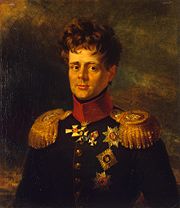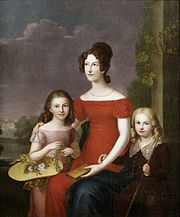| Duke Eugen of Württemberg | |
|---|---|

| |
| Eugen of Württemberg, painting by George Dawe (Military Gallery of the Winter Palace) | |
| Personal details | |
| Born | 8 January 1788 Oels, Kingdom of Prussia |
| Died | 8 January 1857 (aged 69) Bad Carlsruhe, Kingdom of Prussia |
| Spouse(s) | Princess Mathilde of Waldeck and Pyrmont Princess Helene of Hohenlohe-Langenburg |
Duke Eugen of Württemberg (German language: Herzog Friedrich Eugen Carl Paul Ludwig von Württemberg; 8 January 1788 – 16 September 1857) was a German prince and a General of Infantry in the Imperial Russian Army during the Napoleonic Wars.
Early life and family[]
Duke Eugen was born at Oels, Lower Silesia, Kingdom of Prussia (now Oleśnica, Poland) first child of Duke Eugen of Württemberg (1758–1822), (son of Frederick II Eugene, Duke of Württemberg, and Margravine Sophia Dorothea of Brandenburg-Schwedt) and his wife, Princess Louise of Stolberg-Gedern (1764–1834), (daughter of Prince Christian Karl of Stolberg-Gedern and Countess Eleanore Reuss of Lobenstein). His younger brother was the explorer Duke Paul Wilhelm of Württemberg. His aunt was Empress Maria Feodorovna the consort of Paul I of Russia.
Since 1776 he lived in Russia. As a child, Eugen followed his aunt to the Tsar's court. After his cadet years in St. Petersburg, he began a brilliant career in the Imperial Russian Army. The murder of his uncle Paul I in 1802 interrupted the first military service. His further education took place in Silesia by Ludwig von Wolzogen.
Military career[]
After a few years his military career reactivated and by 1805 he was already major-general. He participated in the campaigns from 1806 to 1807 in East Prussia against France and 1810 in part of Turkey. He accompanied his father Eugen, who was commander of Prussian Reserve, in 1806. He joined staff of Russian General Bennigsen. In 1812, he was a division commander (4th div of II Corps) under Barclay de Tolly. During the French invasion of Russia he fought at the Battles of Borodino, Krasnoi. At the War of the Sixth Coalition he fought at the Battles of Lutzen, Bautzen, Dresden, Kulm, and Leipzig, where he distinguished himself.[1]
In 1828, he commanded the Russian 7th Army Corps in the Russo-Turkish War (1828–1829). He retired after the Treaty of Adrianople.[2]
He was interested in music. He was acquainted with Carl Maria von Weber, who was his father's music director of 1806-1807. He also composed several operas, and many songs, including "The Ghost Bride".
Marriage and issue[]

His first wife Mahthilde, with their son Eugen and daughter Marie. Portrait by Carl Rothe, c. 1820's.
On 21 January 1817, in Arolsen, he married Princess Mathilde of Waldeck and Pyrmont (1801–1825), daughter of George I, Prince of Waldeck and Pyrmont and Princess Augusta of Schwarzburg-Sondershausen. They had three children:
- Duchess Marie of Württemberg (25 March 1818 – 10 April 1888), married in 1845 to Charles II, Landgrave of Hesse-Philippsthal, had issue.
- Duke Eugen of Württemberg (25 December 1820 – 8 January 1875), married in 1843 to Princess Mathilde of Schaumburg-Lippe, had issue.
- Duke William Alexander of Württemberg (13 April 1825 – 15 April 1825)
On his first wife's death, Eugen married secondly in 1827 to Princess Helene of Hohenlohe-Langenburg (1807–1880), daughter of Charles Louis, Prince of Hohenlohe-Langenburg and Countess Amalie of Solms-Baruth. They had four children
- Duke William of Württemberg (20 July 1828 – 5 November 1896)
- Duchess Alexandrine Mathilde of Württemberg (16 December 1829 – 2 September 1913)
- Duke Nicholas of Württemberg (1 March 1833 – 22 February 1903), married in 1868 his niece Duchess Wilhelmine of Württemberg, no issue.
- Duchess Agnes of Württemberg (13 October 1835 – 10 July 1886), married in 1858 to Heinrich XIV, Prince Reuss Younger Line, had issue.
Ancestry[]
| Ancestors of Duke Eugen of Württemberg (1788–1857) | ||||||||||||||||||||||||||||||||||||||||||||||||||||||||||||||||||||||||||||||||||||||||||||||||||||||||||||||||||||||||||||||||||||||||||||||||||||||||||||||||||||||||||||||||||||||||||||||||||||||||||||||||||||||||||||||||||||||||||||||||||||||||||||||||||||||||||||||||||||||||||||||||||||||||||||||||||||||||||||||||||||||||||||||||||||||||||||||||||||||||||||||||||||||||||||||||||||||||||||||||||||||||||||||||||||||||||||||||||||||||||||||||||||||||||||||||||||||||||||||||||||||||||||||||||||||||||||||||||
|---|---|---|---|---|---|---|---|---|---|---|---|---|---|---|---|---|---|---|---|---|---|---|---|---|---|---|---|---|---|---|---|---|---|---|---|---|---|---|---|---|---|---|---|---|---|---|---|---|---|---|---|---|---|---|---|---|---|---|---|---|---|---|---|---|---|---|---|---|---|---|---|---|---|---|---|---|---|---|---|---|---|---|---|---|---|---|---|---|---|---|---|---|---|---|---|---|---|---|---|---|---|---|---|---|---|---|---|---|---|---|---|---|---|---|---|---|---|---|---|---|---|---|---|---|---|---|---|---|---|---|---|---|---|---|---|---|---|---|---|---|---|---|---|---|---|---|---|---|---|---|---|---|---|---|---|---|---|---|---|---|---|---|---|---|---|---|---|---|---|---|---|---|---|---|---|---|---|---|---|---|---|---|---|---|---|---|---|---|---|---|---|---|---|---|---|---|---|---|---|---|---|---|---|---|---|---|---|---|---|---|---|---|---|---|---|---|---|---|---|---|---|---|---|---|---|---|---|---|---|---|---|---|---|---|---|---|---|---|---|---|---|---|---|---|---|---|---|---|---|---|---|---|---|---|---|---|---|---|---|---|---|---|---|---|---|---|---|---|---|---|---|---|---|---|---|---|---|---|---|---|---|---|---|---|---|---|---|---|---|---|---|---|---|---|---|---|---|---|---|---|---|---|---|---|---|---|---|---|---|---|---|---|---|---|---|---|---|---|---|---|---|---|---|---|---|---|---|---|---|---|---|---|---|---|---|---|---|---|---|---|---|---|---|---|---|---|---|---|---|---|---|---|---|---|---|---|---|---|---|---|---|---|---|---|---|---|---|---|---|---|---|---|---|---|---|---|---|---|---|---|---|---|---|---|---|---|---|---|---|---|---|---|---|---|---|---|---|---|---|---|---|---|---|---|---|---|---|---|---|---|---|---|---|---|---|---|---|---|---|---|---|---|---|---|---|---|---|---|---|---|---|---|---|---|---|---|---|---|---|---|---|---|---|---|---|---|---|---|---|---|---|---|---|---|---|---|---|---|---|---|---|---|---|---|---|---|---|---|---|---|---|---|---|---|---|---|---|---|---|---|---|---|---|---|---|---|---|---|---|---|---|---|---|---|---|---|---|---|---|---|---|---|---|---|---|---|---|---|---|---|---|---|---|---|
| ||||||||||||||||||||||||||||||||||||||||||||||||||||||||||||||||||||||||||||||||||||||||||||||||||||||||||||||||||||||||||||||||||||||||||||||||||||||||||||||||||||||||||||||||||||||||||||||||||||||||||||||||||||||||||||||||||||||||||||||||||||||||||||||||||||||||||||||||||||||||||||||||||||||||||||||||||||||||||||||||||||||||||||||||||||||||||||||||||||||||||||||||||||||||||||||||||||||||||||||||||||||||||||||||||||||||||||||||||||||||||||||||||||||||||||||||||||||||||||||||||||||||||||||||||||||||||||||||||
Notes and sources[]
- This article incorporates information from the equivalent article on this wikiNo language provided for the interwiki translation template!
- ↑ http://www.napoleonsims.com/people/people.htm
- ↑ The Encyclopedia Americana: a library of universal knowledge, Volume 10, Encyclopedia Americana Corp., 1918
- Sources
- The Royal House of Stuart, London, 1969, 1971, 1976, Addington, A. C., Reference: page 222
- External links
- Genealogics - Leo van de Pas - Eugen, Herzog von Württemberg
- thePeerage.com - Eugen Herzog von Württemberg
- Topic: Duke Eugen von Württemberg (1788–1857) and his descendants
The original article can be found at Duke Eugen of Württemberg (1788–1857) and the edit history here.